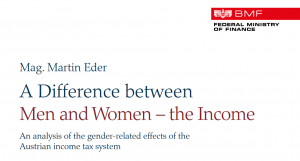
Anna Zachorowska is Erasmus Coordinator at the Institute of Economics, Finance and Management der Jagiellonian University, Poland.
- What made you get active in Gender Budgeting? What do your present activities in this area look like?
I am an academic whose main area of research is feminist economics. I am writing mainly about macroeconomics and gender. Since I was theoretically interested in this subject in 2012, a group of human rights activists from Krakow asked me to become a part of project concerned with the city of Krakow. This a group of activists we have prepared a gender budget of the city of Krakow.
- Could you please summarise your experiences with Gender Budgeting in national projects.
The project that I was personally involved in was a national project concentrated on the second biggest city in Poland – Krakow. Additionally I was also involved in the report concerning the possibility of adoptation of Austrian gender responsive budgeting in Poland, within the European project Exchange of good practices on gender equality.Continue Reading POLAND: Looking Beyond Our Nose
 From 19-23 June 2018, the National Commission on Women Affairs and Socio-Demographic Policy of Kasachstan organised a study visit to Vienna featuring Gender Budgeting in which mostly members of the Ministry of Finance and the Ministry of Economy of Kasachstan participated.
From 19-23 June 2018, the National Commission on Women Affairs and Socio-Demographic Policy of Kasachstan organised a study visit to Vienna featuring Gender Budgeting in which mostly members of the Ministry of Finance and the Ministry of Economy of Kasachstan participated. Interview with Oliver Rohbeck, Berlin
Interview with Oliver Rohbeck, Berlin  31/05/2017: This day marked the date when the fourth report on the impact-oriented impact assessment (WFA Bericht) was submitted to the National Council . The report is a summary of the results of the internal evaluations carried out by the ministries and other supreme organs. It is compiled by the Federal Performance Management Office, which is part of the Federal Chancellery. The
31/05/2017: This day marked the date when the fourth report on the impact-oriented impact assessment (WFA Bericht) was submitted to the National Council . The report is a summary of the results of the internal evaluations carried out by the ministries and other supreme organs. It is compiled by the Federal Performance Management Office, which is part of the Federal Chancellery. The 
 At least since 2014, it has been clear to us that the Austrian Gender Budgeting model has become an international example of best practice. Back then, a
At least since 2014, it has been clear to us that the Austrian Gender Budgeting model has become an international example of best practice. Back then, a 